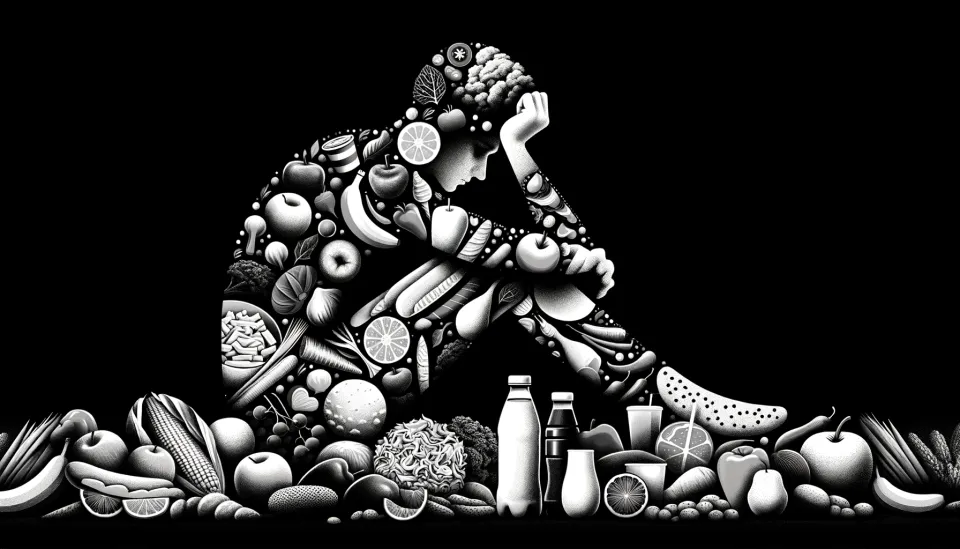How Depression Affects Eating and How to Heal

Depression is a common yet often misunderstood condition affecting millions worldwide. A crucial yet frequently overlooked aspect is how depression and food choices interact.
Does what we eat influence our mental health, or do our eating habits suffer because of depression?
Understanding this intricate relationship can pave the way for better mental and physical health.
What is Depression?
Depression is more than just feeling down or having a bad day. It’s a persistent feeling of sadness and loss of interest that lasts for more than two weeks, affecting how a person feels, thinks, and handles daily activities.
Symptoms of Depression
The symptoms of depression can vary but often include:
- Continuous low mood or sadness
- Low self-esteem
- Feelings of hopelessness and helplessness
- Being tearful
- Feeling guilt-ridden
- Irritability and intolerance of others
- Lack of motivation and interest
- Difficulty in making decisions
- Lack of enjoyment in life
In severe cases, these feelings can lead to thoughts of self-harm or suicide.
The Vicious Cycle of Depression and Eating Habits
Depression and eating habits are closely linked, creating a vicious cycle that can be hard to break.
Changes in Eating Habits
- Overeating: Some people turn to food for comfort, leading to weight gain and associated health problems.
- Loss of Appetite: Others may lose interest in eating, leading to weight loss and nutritional deficiencies.
Poor Food Choices
Depression can lead to cravings for unhealthy foods, high in sugar and fats, providing temporary comfort but causing long-term health issues like obesity and diabetes.
Impact on Health
Poor eating habits and the physical effects of depression can lead to serious health problems, including:
• Obesity
• Heart disease
• Diabetes
• Weakened immune system
Does Food Make Us Depressed?
Research suggests that what we eat can influence our mental health.
Diets high in processed foods, sugars, and unhealthy fats are linked to an increased risk of depression.
Conversely, diets rich in fruits, vegetables, lean proteins, and whole grains are associated with better mental health outcomes.
Biological Mechanisms
Certain foods can affect brain chemistry and mood. For instance:
- Sugars: High sugar intake can lead to inflammation and insulin resistance, both linked to depression.
- Omega-3 Fatty Acids: Found in fish, flaxseeds, and walnuts, these can help reduce inflammation and support brain health.
- Antioxidants: Found in fruits and vegetables, they help combat oxidative stress, which can negatively impact mental health.
Does Depression Lead to Poor Eating Habits?
Depression can significantly impact one’s relationship with food. People with depression may use food as a coping mechanism, leading to overeating or cravings for unhealthy foods.
Conversely, depression can cause a loss of appetite and disinterest in eating, leading to nutritional deficiencies.
Tangible Steps to Break the Cycle
Understanding the connection between depression and food is the first step.
Here are practical steps to improve both mental and physical health:
Seek Professional Help
- Therapy: Cognitive-behavioral therapy (CBT) and other forms of psychotherapy can be very effective.
- Medication: Antidepressants may be prescribed by a doctor to help balance brain chemicals.
Improve Your Diet
- Balanced Diet: Focus on a diet rich in fruits, vegetables, lean proteins, and whole grains.
- Omega-3 Fatty Acids: Include sources like fish, flaxseeds, and walnuts.
- Limit Processed Foods: Reduce intake of sugars and unhealthy fats.
Lifestyle Changes
- Exercise: Regular physical activity can boost mood and energy levels.
- Sleep: Ensure you get enough rest each night.
- Hydration: Drink plenty of water to stay hydrated.
Build a Support Network
- Stay Connected: Maintain relationships with friends and family.
- Join Support Groups: Sharing experiences with others who understand can be comforting.
Practice Mindfulness and Relaxation
- Meditation: Regular meditation can help manage stress and improve mood.
- Relaxation Techniques: Activities like yoga and deep breathing exercises can reduce anxiety.
Reflective Prompts for Personal Growth
- What small changes can you make in your daily routine to improve your mood?
- Who in your support network can you reach out to for help?
- What activities bring you joy, and how can you incorporate them into your life more often?
Understanding and addressing the connection between depression and food is crucial for improving mental